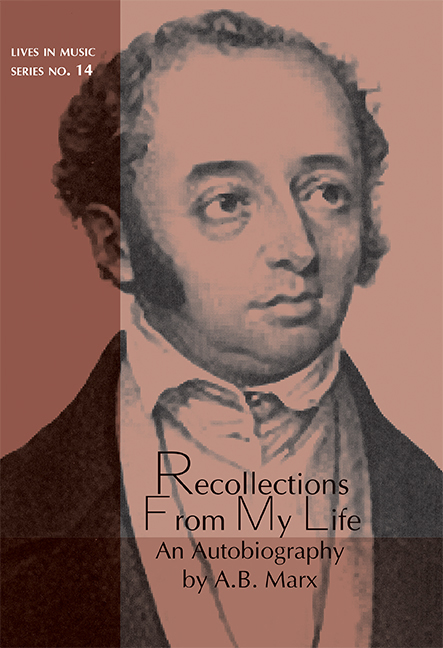Book contents
- Frontmatter
- Contents
- Introduction
- Select Bibliography
- Contents of Volume One
- Contents of Volume Two
- 1 My relationship with Spontini
- 2 Exit from a legal career
- 3 First steps into public life
- 4 Beginning a career as a writer
- 5 Nicola Paganini
- 6 The Musikalische Zeitung and its end
- 7 The Mendelssohn House
- 8 Felix Mendelssohn
- 9 Travel and recreation
- 10 The Wide World
- 11 Mose
- 12 Therese
- 13 Achievements
- 14 Auch diese? Wort hat nicht gelogen
- 15 Friedrich Wilhelm IV
- 16 “Wem gelingt es, trübe Frage”
- Afterword in place of foreword
- Translator's Note on Indexing
5 - Nicola Paganini
from Contents of Volume Two
- Frontmatter
- Contents
- Introduction
- Select Bibliography
- Contents of Volume One
- Contents of Volume Two
- 1 My relationship with Spontini
- 2 Exit from a legal career
- 3 First steps into public life
- 4 Beginning a career as a writer
- 5 Nicola Paganini
- 6 The Musikalische Zeitung and its end
- 7 The Mendelssohn House
- 8 Felix Mendelssohn
- 9 Travel and recreation
- 10 The Wide World
- 11 Mose
- 12 Therese
- 13 Achievements
- 14 Auch diese? Wort hat nicht gelogen
- 15 Friedrich Wilhelm IV
- 16 “Wem gelingt es, trübe Frage”
- Afterword in place of foreword
- Translator's Note on Indexing
Summary
Suddenly a new light appeared like a comet on the richly-starry sky of those days. In 1829 Paganini arrived in Berlin.
Earlier I had heard Spohr with his spouse, the notable harpist, on a tour through Thuringia in Merseburg. His broad stroke, his soft and yet piercing cantilena, his entirely noble, if also unison and always elegiac manner, enjoyed support and indeed amazement everywhere. Many other virtuosos, of the violin, or of other instruments, had passed through. Now the Italian virtuoso had arrived, and a tremendous clamor, which also had its peculiar side, had preceded him. Once again the rare occasion had occurred-a fiddler had set people to talking, as they had only been accustomed to do in the dark and distant past. He must have been a freed galley slave, sentenced for political subversion. Out of pity he was allowed to keep his instrument. Because, however, with its help he had stirred up his fellow prisoners, inciting their feelings about their crimes and punishment, all but the lowest strings of the instrument had been cut off. People pointed to the odd, wobbling way he walked, with feet slightly pointed outwards: that was the result of the long years he had worn chains. Others whispered about a crime in hot Italy: he had found an unutterably beloved maiden in the arms of another, and killed her on the spot. Now he was wandering in foreign lands, without peace in the cold and foggy lands of the North.
Was there some basis to the rumors?—Probably only in the excited fantasies of the people. But they were there, though one did not know where from. And they were believed—not with that veracity that required by the researcher or judge, but with that credulous and macabre devotion, with which we see the poet and the poetical folk shine the light on the truth amidst its fairy-tale trappings.
Now he had arrived!
The opera house was full to bursting; everyone was waiting expectantly. Some sort of overture was played.
- Type
- Chapter
- Information
- Recollections From My LifeAn Autobiography by A. B. Marx, pp. 149 - 152Publisher: Boydell & BrewerPrint publication year: 2017



